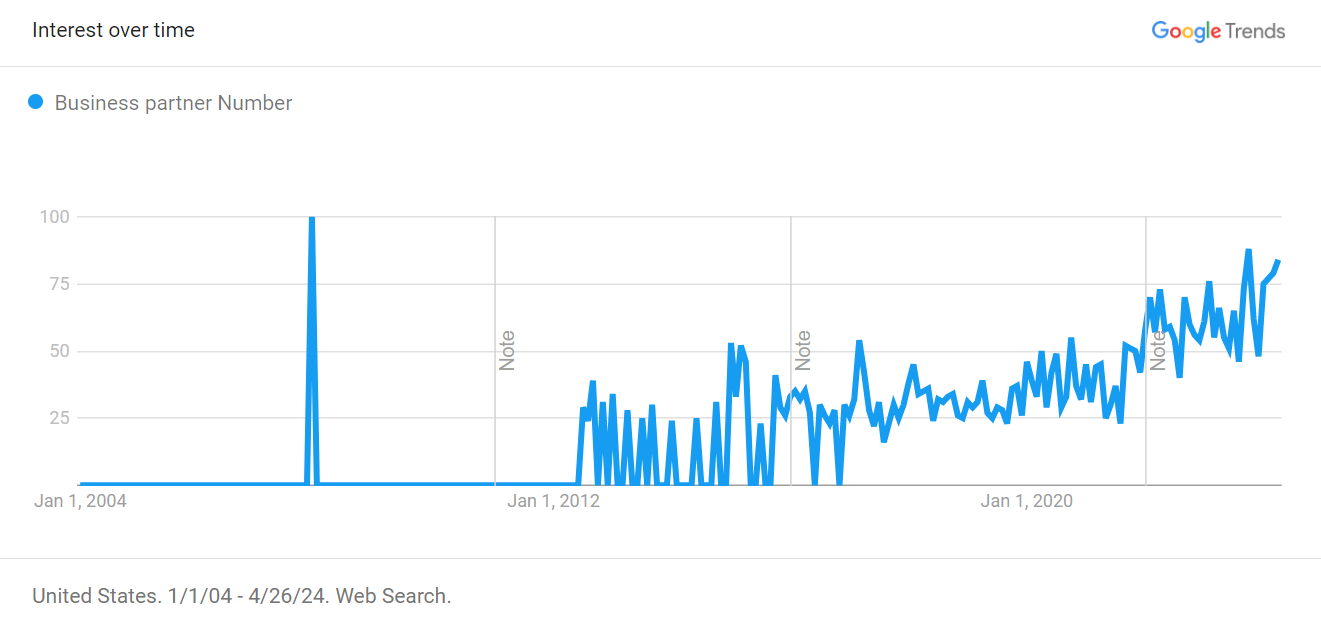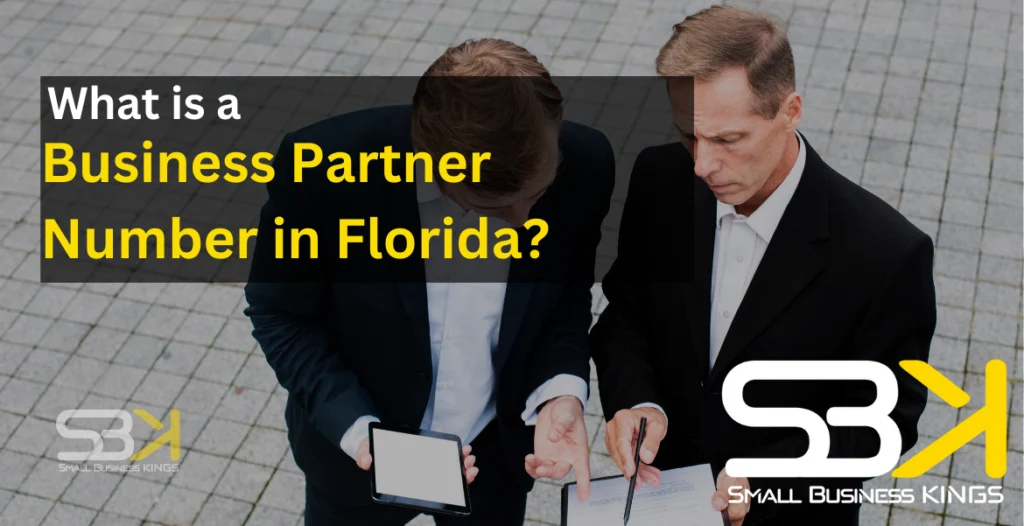If you are a business owner, you might have come across the term business partner number or BPN in Florida. BPN serves as a great help if you’re interacting with state agencies through your business. But what exactly does this term signify, and why is it significant in the business landscape of Florida? We’ll explore these questions below.
What is a Business Partner Number (BPN)?

A Business Partner Number, commonly abbreviated as BPN, is a unique identification number assigned to businesses operating in the state of Florida. It serves as a means of identification for various business-related transactions and interactions with state agencies.
Importance of BPN in Florida
The significance of having a Business Partner Number in Florida cannot be overstated. It acts as a fundamental element in ensuring compliance with state regulations and facilitates seamless business operations within the state’s jurisdiction.
- Regulatory Compliance: The Florida Department of Revenue administers over 30 taxes and fees, and in most cases, businesses must register with the Department as a dealer before commencing taxable activities. The BPN serves as a unique identifier, ensuring compliance with state regulations and avoiding penalties.
- Facilitating Transactions: BPNs streamline business interactions, enabling efficient transactions with state agencies and partners. Businesses can register using the Florida Business Tax Application (online or paper Form DR-1), which guides them through identifying tax responsibilities and registering to collect, report, and pay various Florida taxes and fees.
- Tax Reporting: BPNs facilitate accurate tax reporting, ensuring businesses meet their obligations promptly and accurately.
- Licensing and Permits: Businesses often require BPNs for obtaining licenses and permits, essential for legal operations.
Get Your Business License Hassle-Free!
No guesswork, no stress—we handle the paperwork for you. Apply today and get your business licensed easily!
How to Obtain a Business Partner Number
Now that we understand the importance of a Business Partner Number, let’s delve into the process of obtaining one.
Requirements
To register your business in Florida and obtain a Business Partner Number, you will need to provide the following information:
- Legal name of the business entity, including the trade name (if any).
- Business mailing address and physical street address of the business location, along with the county.
- Physical street address of rental or lease properties, if applicable.
- Date of the first taxable activity at the business location being registered.
- North American Industry Classification System (NAICS) Code for each business activity.
- Information about owners or managers, including name, title, address, identification number (SSN, Visa #, or FEIN), and telephone number.
- Employee information, including the number of employees, anticipated wages, employer type, type of services provided, and payroll agent details if applicable.
- Mailing addresses for reporting forms, tax rate information, and benefits paid information.
Additional Applications You May Need
In addition to the Florida Business Tax Application, there are other applications you may need to consider:
- Amusement Machine Certificate (Form DR-18): Required for each location where coin-operated amusement machines are operated.
- Self-Accrual Authority / Direct Pay Permit – Communications Services Tax (Form DR-700030): Used to obtain a Communications Services Tax Direct Pay Permit for services originating outside Florida.
- Self-Accrual Authority / Direct Pay Permit – Sales and Use Tax (Form DR-16A): Used to obtain a Sales and Use Tax Direct Pay Permit as authorized by section 212.183, Florida Statutes.
- Registration Application for Secondhand Dealers and Secondary Metals Recyclers (Form DR-1S): Required for those involved in secondhand goods or scrap metal transactions.
- Report to Determine Succession and Application for Transfer of Experience Rating Records (Form RTS-1S): Required if there is a change in business ownership for reemployment tax purposes.
- Independent Contractor Analysis (Form RTS-6061): Required for those employing self-employed, independent contractors.
Find Out More: What is Authoritative Legal Entity Identifier (ALEI) Number?
Florida Business Tax Application
Before you are awarded the BPN or your business is registered, the Florida Business Tax Application (online or paper Form DR-1) guides you through identifying your tax responsibilities and registering to collect, report, and pay various Florida taxes and fees, including but not limited to:
- Communications services tax
- Rental car surcharge
- Documentary stamp tax
- Reemployment tax
- Gross receipts tax on dry-cleaners
- Prepaid wireless fee
- Gross receipts tax on electrical power and gas
- Severance taxes (solid mineral, gas, sulfur, and oil production)
- Lead-acid battery fee
- Miami-Dade County Lake Belt fees
- Waste tire fee
Application process
The application process for obtaining a Business Partner Number typically involves submitting a formal application to the relevant state agency responsible for business registrations. This may be done online or through traditional paper forms, depending on the agency’s guidelines.
Step 1: Determine Your Tax Responsibilities
Before initiating the application process, it’s crucial to understand your business’s tax responsibilities. Identify the taxes and fees applicable to your business activities in Florida.
Step 2: Gather Required Information
Collect all necessary information and documents needed for the registration process. This includes details about your business entity, such as legal and trade names, mailing address, physical location, and NAICS codes for business activities.
Step 3: Select the Application Method
Decide whether to submit the application online or using paper Form DR-1. The online application offers convenience and efficiency, allowing for faster processing times.
Step 4: Complete the Application Form
Fill out the Florida Business Tax Application (Form DR-1) accurately and thoroughly. Provide all requested information, including business details, owner or manager information, and employee details if applicable.
Step 5: Additional Applications, if Necessary
Depending on your business activities, you may need to submit additional registration applications alongside Form DR-1. These could include applications for specific taxes or permits, such as the Application for Amusement Machine Certificate or Application for Self-Accrual Authority.
Step 6: Submit the Application
Once the application form and any additional required applications are completed, submit them to the Florida Department of Revenue. If submitting online, follow the instructions on the Department’s website for electronic submission. For paper forms, ensure all required documents are included and send them to the designated address.
Step 7: Await Processing and Confirmation
After submitting the application, await processing by the Department of Revenue. Processing times may vary depending on the volume of applications received. Once processed, you will receive confirmation of your registration along with any relevant certificates or account numbers.
Ensuring Compliance and Addressing Changes
Businesses must maintain compliance with evolving regulations and address changes promptly. The Department of Revenue must be notified whenever one of the following changes occur in a business.
- Regular Updates: This includes changes in business name, mailing address, or physical location within the same county.
- Changes in Business Structure: This includes scenarios such as mergers, acquisitions, or changes in partnership structures.
- New Registrations for Changes: Businesses must understand the necessity of submitting new registrations for certain changes. For instance:
- Relocation: If a business moves its location from one Florida county to another, a new registration is required to reflect the updated address and jurisdiction.
- Acquisition: When acquiring an existing business, it’s imperative to submit a new registration to reflect the change in ownership and ensure compliance with tax obligations.
- Alteration in Ownership Structure: Any alteration in the ownership structure of the business requires a new registration to accurately reflect the current ownership details.
- Record-Keeping: Maintaining comprehensive records of all transactions, registrations, and communications with the Department is essential. These records serve as valuable documentation in demonstrating compliance during audits or inquiries by regulatory authorities.
FAQs
- What is the purpose of a Business Partner Number?
The purpose of a Business Partner Number is to serve as a unique identifier for businesses operating in Florida, facilitating various transactions and interactions with state agencies. - Is a Business Partner Number necessary for all businesses in Florida?
While not all businesses may require a Business Partner Number, it is necessary for those engaging in certain activities or transactions within the state. - How long does it take to obtain a Business Partner Number?
The timeframe for obtaining a Business Partner Number may vary depending on factors such as the completeness of the application and the processing times of the relevant state agency. In general, it may take a few weeks to process. - Can a Business Partner Number be transferred?
Typically, a Business Partner Number is specific to the business entity to which it is assigned and cannot be transferred to another entity. If there are changes in ownership or structure, a new BPN may be required. - Are there any fees associated with obtaining a Business Partner Number?
There may be fees associated with obtaining or renewing a Business Partner Number, which vary depending on the type of business and the services provided by the state agency responsible for issuing BPNs.


